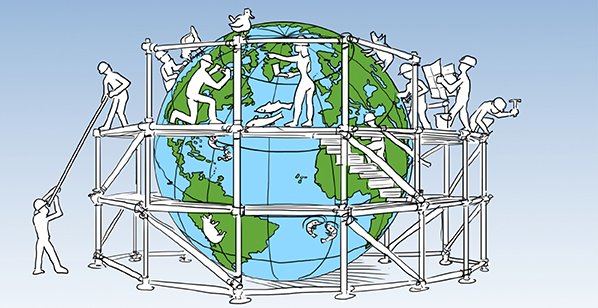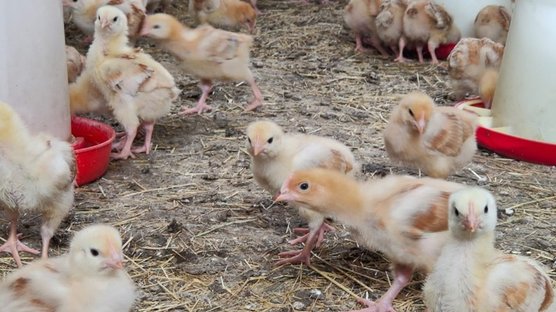
Published on April 23, 2020
Why should the industry focus on sustainable animal breeding?
Sustainable animal breeding is an issue that can best be considered in itself as a complex equation. Its formula can be optimized and balanced by adjusting a combination of factors. Importantly, the factors can vary according to context (geographical location, environment, climate and regulation). Within all this, sustainable animal breeding is a decision-making process that involves multi-criteria. You can appreciate from this simple summary that our job as a breeding company is extremely challenging.
However, it is also very rewarding. Better Breeding Today for a Brighter Life Tomorrow requires combining the right factors towards achieving our mission to support the global food challenge.
Leading towards a positive change
Every aspect of raising animals affects the environment, so sustainability is a key issue in animal production. Sustainable animal breeding can have a large impact on the production of an animal and its consequential effect on the environment. Sustainable animal breeding has a big role to play in meeting the growing demand for animal products and feeding the increasing global population without negative effect on the present or future.
Sustainability is influenced by every element in production- and supply chains. The animal production industry and those that support it have a key role in sustainability by default. It is not a question of inviting the industry to focus on sustainable animal breeding, as it is already inherently involved. It just needs to focus even more on a positive change.
We support a solid plan for a better world
Hendrix Genetics strives to achieve the United Nations’ (UN) 2015 Sustainable Development Goals. These goals were carefully formulated and aim to address the world’s most urgent sustainability challenges. The 2030 Agenda for Sustainable Development was adopted by all United Nations members as a shared blueprint for peace and prosperity. It embodies a common-sense plan to build a better world for people and our planet by 2030.
There are 17 core UN Sustainable Development Goals (SDGs). They are not just goals but represent urgent calls for all countries to act in global partnership. The SDGs recognize that measures to improve our world must be integrated. That attempts to end poverty must be implemented in conjunction with strategies to improve health and education, reduce inequality, and encourage economic growth, while tackling climate change and working to preserve our oceans and forests.
Hendrix Genetics contributes by focusing on four Sustainable Development Goals that all our staff drive forward in their daily work.
- SDG 2. Zero hunger: ending all forms of hunger and malnourishment.
- SDG 12. Responsible consumption and production: reducing the footprint of agriculture world-wide.
- SDG 13. Climate action: action to support vulnerable regions while enabling reduction of emissions.
- SDG 17. Partnerships for the goals: forming partnerships to work toward achieving all SDGs.
We have embraced these SDGs wholeheartedly and have developed solid ideas on how to progress them in our own business. Through our everyday work, we are already implementing these ideas. And over the next five years, we will continue to focus our efforts on them.
Feeding more people
Through selection of the right animals, we can ensure that their productivity and efficiency provide a better animal protein source for less resources and minimize the impact of each individual animal on the environment. Boosting yields through better genetics and delivering more productivity is what Hendrix Genetics has excelled in for decades. We have become so good in breeding layers, for instance, that our hens have been proven to lay an average of 43% more eggs during their productive lifetime than hens in the 1960’s. With the same amount of laying hens, the world has gained 43% more eggs by working with high quality genetics with less environmental impact (Supporting SDG12 & 13).
In addition to this, we are particularly focused on contributing to feeding more people in the key global regions, in which the population is expected to increase the most, for example, in Asia and Africa. Increasing the efficiency of production in these areas now is one of our key priorities to ensure that there will be access to sufficient and affordable protein, where it is most needed, in the future. High quality animal genetics could have most benefit and influence in alleviating hunger in these areas (SDG2), especially those that currently have very limited and possibly impoverished genetic resources, such as sub-Saharan Africa. We partner with global and local vendors, institutes, universities and partners like the Bill and Melinda Gates Foundation to achieve a better outcome (SDG17).
Less is more
Sustainable animal breeding involves selecting the best animals that thrive on less resources. For example, by only breeding the pigs that are most efficient in turning feed into meat, this reduces the cost and amount of global resources required to feed these animals. Pigs are masters when it comes to turning lesser quality feed into protein, giving them the ability to repurpose human food waste and drastically lower the impact on the environment. Sustainable breeding reduces carbon footprint and the impact of livestock production on climate change (SDGs12 & 13).
We are dedicated to a quality approach that delivers the right animals, for the right market, and selecting those that are equipped to face the challenges of specific housing and climate conditions. With a quarter of food produced globally lost or wasted, we are also working on improving the sustainability of animal breeding through enhanced disease resilience of animals. All this contributes to achieving higher survival rates and helps reduce climate change (SDGs 2, 12 & 13).
Partnership is a priority
Hendrix Genetics works closely with a wide variety of companies, universities, governments, research institutes, non-profit organizations, and other authorities to address the world food challenge. These include Breed4Food - a consortium established by five organizations: Wageningen University (a leading agricultural research university in The Netherlands) and four international animal breeding companies. Breed4Food aims to be a world-class center of excellence for research and innovation in livestock genetics. In addition, we are a key member of the European Forum of Farm Animal Breeders (EFFAB) - an association of organizations and companies active in animal breeding and reproduction.
We develop ideas with our partners, and in turn, help raise awareness of the possibilities and importance of sustainable animal breeding. Exploring and building effective partnerships is one of our top priorities (SDG 17). Through this we can really bring sustainable animal breeding to the top of the agenda of animal production.
A brighter future
Sustainable animal breeding has a bright future and will bring increasing answers to the global food challenge. We are proud to help feed the world and build a sustainable future with Better Breeding Today for a Brighter Life Tomorrow.



